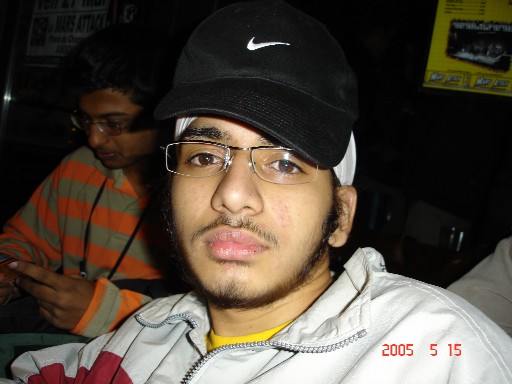hello people
I shall now tell you why the UN sucks.
You see, the UN is an organisation of 191 member nations and was founded in the year 1945. But, having said that, the UN is majorly controlled by that Bush of a country USA and that Liar of a country UK.
And because of that, little nations like Vanuatu get left out. No matter what these little countries have in mind, the UN does whatever USA or UK says. For example, the unnecessary war on Iraq. The actual terrorist lies in that bush of a character BUSH. Hes just the worlds biggest terrorist with that monkey face of his.
What USA fails to realise is that there are actually smarter countries in the world, like Vanuatu, with zero reported cases of HIV/AIDS.
My point here is that
a) UN isnt a world organisation anymore
b) USA is a useless country
c) Bush should be hanged
signing off
G
vendredi, août 05, 2005
Inscription à :
Publier les commentaires (Atom)




9 commentaires:
Amen to Point C.
Manyu
You got that right.
Best of luck for MUN, people :-P
I thoroughly agree with your sentiments about the United States, but I fail to understand how exactly the United Nations can be deemed as thoroughly useless when it is an excellent source of relief funds in event of calamities.
hey,
very sharp of you to notice this all by yourself...and at such a young age...
read a book called "manufacturing consent" by n. chomsky
but anyways, your views are shared by quite a few of the literate few in the world....
and thus, i am going to give a counter point.....i love controversy...rather its not my viewpoint, its a person called Swaminathan s. Anklesaria Aiyar....
He publishes every sunday in TOI, Edi tPage and real interesting stuff....too large a prologue...but it doesn't matter if you read what i've written till now, you must read the next piece completely...
"When Chou En-Lai, Mao's foreign minister, was asked what he thought of the French Revolution, he replied: "It is too early to say." The French Revolution soon led to the Reign of Terror, in which the revolutionary Robespierre guillotined scores of fellow revolutionaries (in the name of democracy and patriotism), and was finally guillotined himself. Critics like Burke, in Britain, said this proved conclusively that democracy was a stupid idea, doomed to end in tragedy. His criticism then sounded self-evident. But today it sounds so myopic that we smile at it. Lesson: many historic events start with blunders and bloodshed, and are recognisable as turning points only decades later.
George W Bush, in the inaugural speech of his second term as US President, pledged to promote democracy and remove all tyrants. Reaction: Gosh, is he going to sack Dick Cheney? Bush will not laugh at the joke: he wants to be taken seriously.
Most Indian commentators denounce his blunders in Iraq. I sometimes feel like screaming when Bush puts on his half-fake smile and lies through his teeth on TV. But I then remind myself that his blunders may be no worse than the French Revolution's, his lies may be no worse than Robespierre's, and we should beware of repeating Burke's myopic condemnation.
Neither Bush nor his successors will spend billions or go to war purely for the altruistic benefit of world democracy. But they may indeed do so in the self-interest of the USA: democracy abroad suddenly looks like an essential condition for America's own security.
For decades, critics have jeered at the US for paying lip-service to democracy but in practice supporting friendly autocrats. This criticism originally came from the left. But after 9/11 it was echoed by neo-conservatives.
In the Middle East, there are no democracies. The US historically aimed (like the Soviet Union) to build bridges with friendly autocrats. But excellent relations with autocrats did not mean excellent relations with Muslim citizens. To many citizens, the US was the evil power that sustained odious rulers. This was felt not only by liberals seeking democracy but Islamic militants. The Muslim Brotherhood in Egypt, Islamists in Algeria, ayatollahs in Iran, the Taliban in Afghanistan, and Osama in Saudi Arabia exemplified the trend.
Meanwhile, autocrats in the region played a cynical game. They totally controlled the media and allowed no criticism of themselves. But they happily allowed virulent criticism of the US, especially on Palestine. Thus, Middle East autocrats cynically channelled public anger away from themselves towards the US, and actually encouraged anti-US feeling. This increased their personal security at the expense of US security, something not understood for a long time. Then, 9/11 exploded the notion that good relations with the Middle East rulers ensured US security. On the contrary, this policy fuelled the hate of fanatical Islamists, who proved on 9/11 that they could inflict immense damage with no support from foreign governments. Osama's quarrel with the Saudi royal family became an attack on the World Trade Centre.
So, many thinkers in the USA now seek a new approach. Quelling militancy cannot be done by friendly autocrats. Rather, it requires a liberal democracy that provides safety valves for grievances, and resolves disputes without making militancy the only outlet for dissidents. So, replace autocracies by democracies, in America's own self-interest.
Good theory, but how is it to be done? Neither Bush nor his critics have a good answer. Some critics favour non-interference, favour waiting for democracy movements to rise indigenously and then support them from outside. But no Saddam or Saudi king will allow this. Waiting for democracy amounts, in practice, to backing autocracy.
On the other hand, Bush's alternative of promoting democracy at gunpoint looks an appalling mess right now. Maybe 50 years down the mess will evolve into proper democracy, as the Reign of Terror did. Maybe in 50 years the Bush invasion will look like the turning point for democracy in the Middle East. Robespierre and Bush are two bloodthirsty incompetents who ruined a good idea. Yet, time has vindicated one and may ltimately vindicate the other. As Chou en-Lai put it, it is too early to say.
But it seems to me probable that the Bush approach will fail. Americans are naive to think that democracy can be transplanted in countries where dissent has traditionally been regarded as treason. Changing the mind-set to make dissent not just permissible but honourable will be very tough. It may take decades. Iraq is a lousy place for such a difficult experiment, given the antagonism between Sunnis, Shias and Kurds.
A democratic Middle East will unquestionably make the world a safer place. But neither Bush nor his critics have produced any convincing way of achieving this. I suspect we face decades of blood and mess. "
A large comment...but worth it ...i suppose...
hey...
nice post...
n anonymous..a very gud comment indeed!
Bush has gotta be the biggest hypocrit there is....& yea...i firmly blv that the UN ain't fair either...
Good going Gudi...
hehe.. pretty accurate except for the part of vanuatu being smart..!!naah im kidding... i suppose none of us really know much about vanuatu but maybe they havent got a single reported case of aids becoz a)they have no contact with the rest of the world wich very well explains why we have never heard of it or b)theyr really corrupt and their population is dominated with hiv positives but they just dont wanna admit it coz thatll make them look bad.
and yeah.. bush should be assassinated.. im actually thinking a bunch of us indian revoluationaries form an organisation and actually kill him.. coz all of this is just passive agression.. we need to get proactive!!
rashi x
a)I agree
b)I agree
c)I TOTALLY agree
gud post.........me commentin after a loooooong time.......have u got a tagboard?
America is useless, yes. But what i'll add another adjective there. Hypocrite! Apart from the UN controversy, they are the ones who "gave birth" to terrorists and now they are being "innocent". Rather funny!
Noice post!
Enregistrer un commentaire